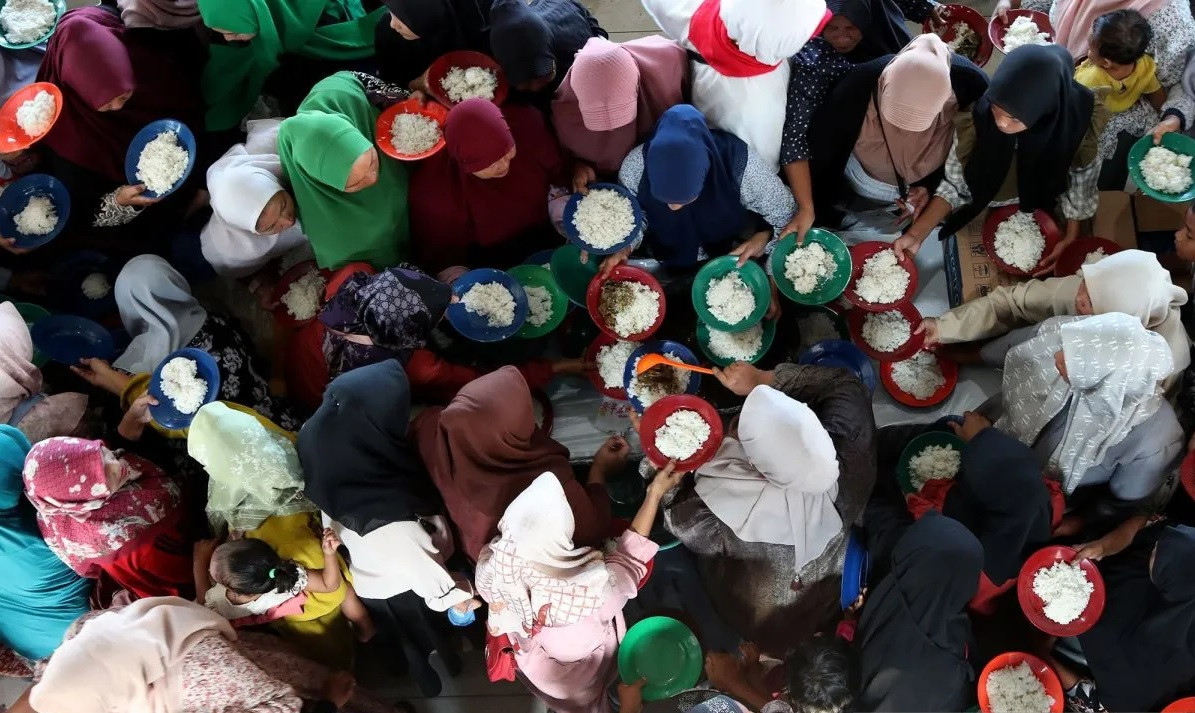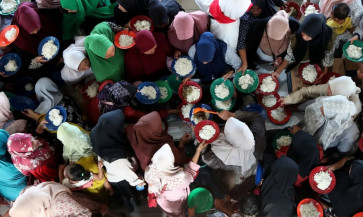Popular Reads
Top Results
Can't find what you're looking for?
View all search resultsPopular Reads
Top Results
Can't find what you're looking for?
View all search resultsTwenty years of peace in Aceh, the fruits of dialogue
Today Aceh enjoys special autonomy and is uniquely governed by an indigenous political party which safeguards Acehnese culture and religious traditions.
Change text size
Gift Premium Articles
to Anyone
 Peace and prosperity: Local people queue for traditional food during a gathering to mark the 20th anniversary of devastating tsunami at Lampulo fish port in Banda Aceh, the capital of Aceh, on Dec 26, 2024. The disaster accelerated the peace negotiation to end decades of armed conflict plaguing the province. (Antara/Irwansyah Putra)
Peace and prosperity: Local people queue for traditional food during a gathering to mark the 20th anniversary of devastating tsunami at Lampulo fish port in Banda Aceh, the capital of Aceh, on Dec 26, 2024. The disaster accelerated the peace negotiation to end decades of armed conflict plaguing the province. (Antara/Irwansyah Putra)
T
wenty years ago, a little-known armed conflict between Aceh, a far-flung natural resource-rich province of Indonesia, and its central government was resolved using the tools of dialogue and mediation.
The Helsinki Memorandum of Understanding (MoU) signed in August 2005 ended a vicious 30-year war that killed 170,000 people. It also lent legitimacy and credibility to the field of mediation worldwide.
Indonesia and the people of Aceh are rightly proud of their ability to peacefully settle this long-running conflict. For those individuals and organizations that helped build and secure the peace in the years leading up to 2005 and afterward, Aceh proved the effectiveness of third-party international mediation and was a valuable testing ground for techniques of monitoring and disarmament that have helped bring peace to other parts of the world afflicted by internal conflict.
The Helsinki agreement was mediated by former Finnish president Martti Athisaari, who won the Nobel Peace Prize for his efforts. Then Indonesian vice president Jusuf Kalla played a pivotal role in persuading the Aceh rebels and Indonesia’s hardline military to see the value of compromise and settlement.
The Centre for Humanitarian Dialogue (HD), the organization I am proud to lead, was then a very small start-up based in Geneva. We played a pioneering and seeding role from 1999, facilitating early encounters between the Free Aceh Movement (GAM) and the Indonesian government.
In those early years, we made the case to both sides that dialogue is more likely than not to lead to the discovery and acceptance of a peaceful means of resolving disputes. This led to an initial understanding between the two sides in 2000 that enabled a humanitarian pause and opened the door to dialogue about a political solution. HD facilitated an early ceasefire agreement in 2002 that did not last, but which laid the foundations for an eventual peaceful settlement.
In the background, Indonesia’s own struggle for democratic reform played an outsized role in preparing the ground. The fall of president Soeharto in May 1998 resulted in a reform-minded government under president B. J. Habibie which paved the way for greater autonomy and self-government across Indonesia’s sprawling archipelago.


















